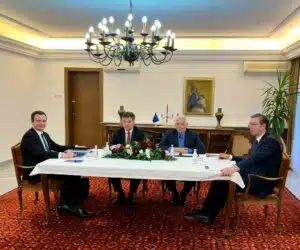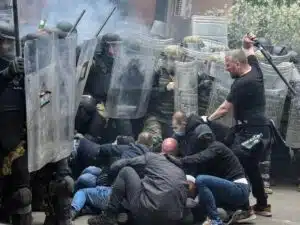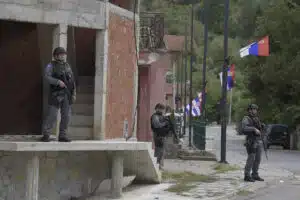Brussels – A year has passed, but relations between Kosovo and Serbia have not improved. On the contrary, “It is regrettable that, despite the efforts of the EU and the wider international community, the progress made by Kosovo and Serbia in implementing their obligations under the Ohrid Agreement has so far been very limited.” is the dry comment of the EU High Representative for Foreign Affairs and Security Policy, Josep Borrell, on the first anniversary of what, on March 18, 2023, was considered a positive turning point for the Balkan region and for dispute settlement between Pristina and Belgrade.

In the 12 hours of discussion in Ohrid, on the shores of the lake in northern Macedonia, a year ago, the green light had been given—but without signature—to the implementation annexe of the very complicated Brussels Agreement reached on February 27 (which had defined the specific commitments for Serbia and Kosovo), the real keystone of the whole scaffolding to establish “what is to be done, by when, by whom, and how.” The Agreement and its implementing annexe have thus become an integral part of the respective EU accession processes of the two Balkan countries, making the implementation of all measures put on paper de facto binding. “The EU has repeatedly recalled that the Agreement is binding in its entirety under international law,” Borrell recalled, reiterating that “any lack
of implementation does not only endanger the Parties’ European
integration, it also damages their reputation as credible and reliable
partners.”
To date, there has been no progress except on those three elements already mentioned in the last high-level meeting in Brussels on September 14 last year as part of the Pristina-Belgrade dialogue. Namely the missing persons statement, the announcement on the joint monitoring committee and the draft presentation on the Association of Serb-majority municipalities in Kosovo. This is precisely the point on which the Pristina-Belgrade dialogue is still stalled and on which tensions continue to be registered, which, throughout 2023, have escalated into dangerous incidents of violence: the 2013 Brussels Agreement never implemented in the community in the country to which should be granted autonomy on a wide range of administrative matters. “
It is now high time for both Kosovo and Serbia to break the current
vicious cycle of crises and tensions and move into a new European
era,” the EU high representative continued the lunge, relaunching the high-level dialogue with the Serbian president, Aleksandar Vučić, and the Kosovar premier, Albin Kurti: “We expect leaders to demonstrate responsibility, vision and leadership by making progress on implementation without further delay.”
The annus horribilis between Kosovo and Serbia
Only two months after the Ohrid understanding, the first event that opened one of the most challenging and violent years for relations between Serbia and Kosovo took place on May 26. Due to the insertion of the newly elected mayors of Zubin Potok, Zvečan, Leposavić, and Kosovska Mitrovica, violent protests broke out, which turned into guerrilla warfare on May 29, even involving soldiers of the international NATO-led KFOR mission. Tensions erupted over the Kurti government’s decision to bring special police forces to allow mayors elected on April 23 into town halls in a controversial election round due to meagre voter turnout.

Meanwhile, an arrest/kidnapping of three Kosovar police officers by Serbian security services was staged on June 14, for which the governments of Pristina and Belgrade accused each other of trespassing by their respective law enforcement agencies. Brussels convened an emergency meeting with PM Kurti and President Vučić to get out of “crisis management mode,” and it was not until June 22 that the release of the three Kosovar police officers came. But because of Pristina’s failure to take a “constructive attitude” to de-escalate the tension, Brussels imposed “temporary and reversible” measures against Kosovo in late June (still in place, despite the roadmap agreed on July 12). However, the situation escalated with the terrorist attack on September 24 near the Serbian Orthodox monastery in Banjska. On the day of clashes between the Kosovo Police and a group of about 30 gunmen, a policeman and three attackers were killed.
Developments in the attack showed clear ramifications in neighbouring Serbia. Among the bombers outside the monastery was also Milan Radoičić, deputy head of Lista Srpska (as confirmed by himself a few days after the armed attack), as well as Milorad Jevtić, a close associate of the Serbian president’s son, Danilo Vučić. To make matters worse, the Serbian “major military deployment” along the administrative border reported by the United States. The threat has not materialized, but the EU has begun to reflect on the ability to impose against Belgrade the same measures in force against Pristina. But the green light needed unanimity in the Council, and Vučić’s closest ally inside the Union—the Hungarian premier, Viktor Orbán—vetoed. As if that were not enough, prior to early elections in Serbia on December 17, the last act of the government led by Ana Brnabić was to send a letter to Brussels to warn that Serbian institutions do not recognize the legal value of the verbal commitments made in the context of the Pristina-Belgrade dialogue and that the de facto sovereignty of Kosovo will not be recognized either.
 The only positive news at the moment is the resolution of the ‘battle of the license plates’ between Serbia and Kosovo, thanks to the decision that came between late 2023 and early 2024 on mutual recognition for vehicles entering the border, even given the unpromising assumptions on which the new year is being set. With the entry into force of the Regulation on Transparency and Stability of Financial Flows and Combating Money Laundering and Counterfeiting, as of February 1, the euro became the sole currency of exchange and deposit in bank accounts: the Serbian dinar can still be exchanged on par with the Albanian lek or the dollar, but the decision will impact all those public services that never adjusted to Pristina’s adoption of the euro in 2002 (even before independence). On February 5, the special police operations at the offices of the temporary institutions run by Serbia in four municipalities in northern Kosovo (Dragash, Pejë, Istog and Klinë) and at the headquarters of the NGO Center for Peace and Tolerance in Pristina have raised controversy in Brussels: since 2008 Belgrade has continued to fund—illegally according to the Kosovo Constitution—
The only positive news at the moment is the resolution of the ‘battle of the license plates’ between Serbia and Kosovo, thanks to the decision that came between late 2023 and early 2024 on mutual recognition for vehicles entering the border, even given the unpromising assumptions on which the new year is being set. With the entry into force of the Regulation on Transparency and Stability of Financial Flows and Combating Money Laundering and Counterfeiting, as of February 1, the euro became the sole currency of exchange and deposit in bank accounts: the Serbian dinar can still be exchanged on par with the Albanian lek or the dollar, but the decision will impact all those public services that never adjusted to Pristina’s adoption of the euro in 2002 (even before independence). On February 5, the special police operations at the offices of the temporary institutions run by Serbia in four municipalities in northern Kosovo (Dragash, Pejë, Istog and Klinë) and at the headquarters of the NGO Center for Peace and Tolerance in Pristina have raised controversy in Brussels: since 2008 Belgrade has continued to fund—illegally according to the Kosovo Constitution—
municipalities, companies, public enterprises, kindergartens, schools, public universities and hospitals available to the Serb minority.
Find more insights on the Balkan region in the newsletter BarBalcani hosted by Eunews
English version by the Translation Service of Withub



